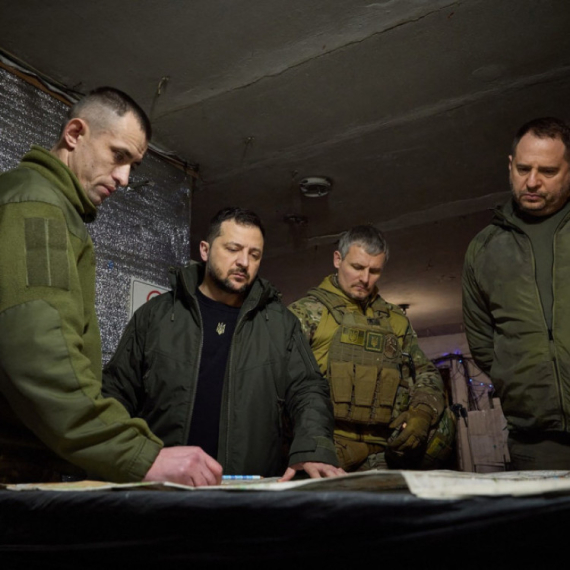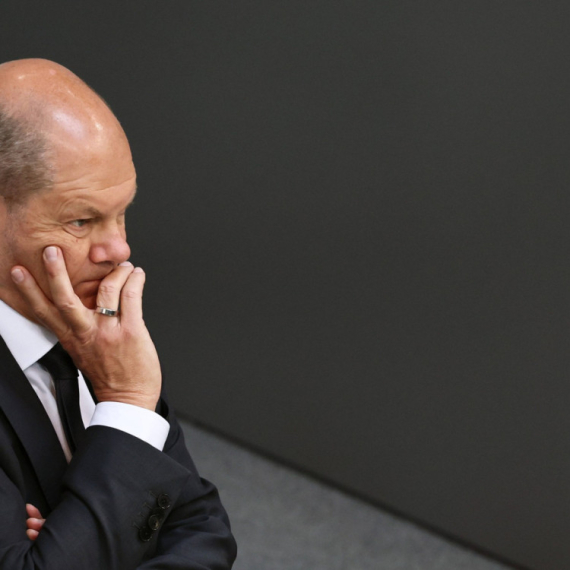"Serbia to continue financing institutions in Kosovo"
Serbian President's Foreign Policy Advisor Marko Đurić has said that Serbia would not stop financing its institutions in Kosovo and Metohija.
Friday, 09.11.2012.
17:20

BELGRADE Serbian President's Foreign Policy Advisor Marko Djuric has said that Serbia would not stop financing its institutions in Kosovo and Metohija. Speaking on Friday in Belgrade, he qualified as positive the results of the meetings held by Ivica Dacic and Hashim Thaci in Brussels. "Serbia to continue financing institutions in Kosovo" Djuric told International Radio Serbia (MRS) that Serbia had nothing against transparency in the field of public finances in any part of its territory, including Kosovo and Metohija, specifying that this did not mean that Serbia would stop taking part in the financing of Kosovo Serbs. He qualified as positive Dacic-Ashton-Thaci talks, stressing they confirmed the decision of the Serbian government to implement the agreements the previous government had reached in full. "Serbia wants to strengthen its credentials in the period preceding the essential stage of talks with Pristina," Djuric stressed. He said joint commissions for the implementation of the agreement on integrated administrative line management would be formed, in which representatives of Belgrade, Pristina and the EU will determine every single aspect of the agreement. Djuric voiced belief that, when it comes to the implementation of the agreement on integrated administrative line control, Serbian government representatives would insist that the Serbian Constitution and legislation be respected and that status neutrality be an imperative. Djuric also expressed his expectation that at its December session, the Council of Europe will support Serbia’s further EU integration. "I am optimistic when it comes to reforms Serbia is implementing on its European course, but we will never place any other political category above the interests of our country," Djuric emphasized. "I expect the Council of Europe to support Serbia’s European integration at its forthcoming session, as well as to respect the fact that our country is implementing reforms in its own interest, just as it carries out the political dialogue with provisional Pristina institutions in its own interests," Djuric pointed out. However, he did not want to comment on a possibility that Belgrade might soon get the start date for the EU accession talks. "The efforts Serbia exerted over the past few months in this area are significant. Belgrade started implementing agreements that the previous Government had reached with Pristina although these agreements are neither simple nor overly positive. We have undertaken important steps in the field of internal reforms, too, especially in terms of the fight against corruption and organized crime, the reform of judiciary, and other spheres with remarkable progress has been made. This has been also indicated in the latest report of the European Commission where Serbia has been positively ranked in 26 chapters pertaining to EU integration," the president's advisor noted. Speaking about Serbia’s position in talks on Kosovo, he said that it is based on vital state and national interests, as well as the fact that in the past period, Serbia has accepted a number of compromise-based solutions. Therefore, Belgrade now wants to offer a platform that will lead to reaching a mutually acceptable solution for the southern Serbian province, Djuric stated. Asked when the state platform on Kosovo is expected to be adopted, Djuric said that the process develops according to determined dynamics, and that the state leadership reviews all important issues pertaining to the southern Serbian province on a regular basis and from different angles. "As the Kosovo issue is so delicate, there can be not rushed-out decisions or time limitations in this process, even when the element of urgency is taken into consideration“, Djuric concluded. Marko Djuric (Tanjug, file) Tanjug MRS
"Serbia to continue financing institutions in Kosovo"
Đurić told International Radio Serbia (MRS) that Serbia had nothing against transparency in the field of public finances in any part of its territory, including Kosovo and Metohija, specifying that this did not mean that Serbia would stop taking part in the financing of Kosovo Serbs.He qualified as positive Dačić-Ashton-Thaci talks, stressing they confirmed the decision of the Serbian government to implement the agreements the previous government had reached in full.
"Serbia wants to strengthen its credentials in the period preceding the essential stage of talks with Priština," Đurić stressed.
He said joint commissions for the implementation of the agreement on integrated administrative line management would be formed, in which representatives of Belgrade, Priština and the EU will determine every single aspect of the agreement.
Đurić voiced belief that, when it comes to the implementation of the agreement on integrated administrative line control, Serbian government representatives would insist that the Serbian Constitution and legislation be respected and that status neutrality be an imperative.
Đurić also expressed his expectation that at its December session, the Council of Europe will support Serbia’s further EU integration.
"I am optimistic when it comes to reforms Serbia is implementing on its European course, but we will never place any other political category above the interests of our country," Đurić emphasized.
"I expect the Council of Europe to support Serbia’s European integration at its forthcoming session, as well as to respect the fact that our country is implementing reforms in its own interest, just as it carries out the political dialogue with provisional Priština institutions in its own interests," Đurić pointed out.
However, he did not want to comment on a possibility that Belgrade might soon get the start date for the EU accession talks.
"The efforts Serbia exerted over the past few months in this area are significant. Belgrade started implementing agreements that the previous Government had reached with Priština although these agreements are neither simple nor overly positive. We have undertaken important steps in the field of internal reforms, too, especially in terms of the fight against corruption and organized crime, the reform of judiciary, and other spheres with remarkable progress has been made. This has been also indicated in the latest report of the European Commission where Serbia has been positively ranked in 26 chapters pertaining to EU integration," the president's advisor noted.
Speaking about Serbia’s position in talks on Kosovo, he said that it is based on vital state and national interests, as well as the fact that in the past period, Serbia has accepted a number of compromise-based solutions.
Therefore, Belgrade now wants to offer a platform that will lead to reaching a mutually acceptable solution for the southern Serbian province, Đurić stated.
Asked when the state platform on Kosovo is expected to be adopted, Đurić said that the process develops according to determined dynamics, and that the state leadership reviews all important issues pertaining to the southern Serbian province on a regular basis and from different angles.
"As the Kosovo issue is so delicate, there can be not rushed-out decisions or time limitations in this process, even when the element of urgency is taken into consideration“, Đurić concluded.



























































Komentari 4
Pogledaj komentare